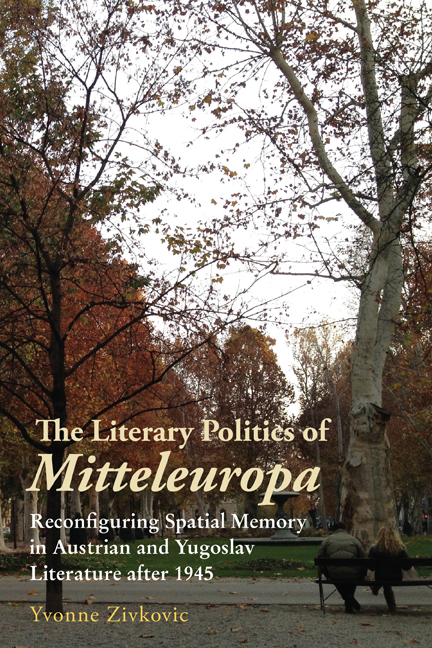 The Literary Politics of Mitteleuropa
The Literary Politics of Mitteleuropa Book contents
- Frontmatter
- Contents
- Acknowledgments
- Abbreviations and Note on Translations
- Introduction: Mitteleuropa as a Transnational Memory Discourse
- 1 The Legacy of Mitteleuropa: Between Geopolitics and Geopoetics
- 2 Ingeborg Bachmann and Peter Handke: The Austrian Mitteleuropa
- 3 Mitteleuropa as Conflicted Community in the Writings of Danilo Kiš and Aleksandar Tišma
- 4 Mitteleuropa after 1989: New Memory Challenges in Christoph Ransmayr and Dubravka Ugrešić
- Conclusion: Mitteleuropa Literature in the Twenty-First Century: Revisiting the Promise of Border-Crossing
- Bibliography
- Index
Introduction: Mitteleuropa as a Transnational Memory Discourse
Published online by Cambridge University Press: 23 March 2021
- Frontmatter
- Contents
- Acknowledgments
- Abbreviations and Note on Translations
- Introduction: Mitteleuropa as a Transnational Memory Discourse
- 1 The Legacy of Mitteleuropa: Between Geopolitics and Geopoetics
- 2 Ingeborg Bachmann and Peter Handke: The Austrian Mitteleuropa
- 3 Mitteleuropa as Conflicted Community in the Writings of Danilo Kiš and Aleksandar Tišma
- 4 Mitteleuropa after 1989: New Memory Challenges in Christoph Ransmayr and Dubravka Ugrešić
- Conclusion: Mitteleuropa Literature in the Twenty-First Century: Revisiting the Promise of Border-Crossing
- Bibliography
- Index
Summary
IN HER LITERARY MEMOIR weiter leben: Eine Jugend (Living On: A Youth, 1991), the Austrian author and Holocaust survivor Ruth Klüger relates her experience of arriving in Auschwitz-Birkenau with her mother. Her mother, Klüger tells us, was aware of the precariousness of their situation early on, confronting her twelve-year old daughter with the likelihood of their imminent deaths. Klüger describes her mother's lucidity as somewhat uncanny and in any case out of the ordinary, and cites another prisoner's assessment as an example for more commonly held assumptions:
Mitteleuropäer in Birkenau. Da war die Studienrätin, die nach ihrer Ankunft in Auschwitz und angesichts der rauchenden, flammenden Kamine mit Überzeugung dozierte, daß das Offensichtliche nicht möglich sei, denn man befinde sich im 20. Jahrhundert und in Mitteleuropa, also im Herzen der zivilisierten Welt. Ich weiß es noch wie heute: Ich fand sie lächerlich, und zwar nicht, weil sie an den Massenmord nicht glauben wollte… . Das Lächerliche waren die Gründe, das mit der Kultur und dem Herzen Europas.
[Central Europeans in Birkenau. There was a woman high school teacher who shortly after her arrival, in the face of the smoking, flaming crematoria, lectured us with touching conviction on how the obvious wasn't possible, for this was the twentieth century and we were in [Central] Europe, that is, at the heart of the civilized world. And I recall how ridiculous she seemed to me. Not because she didn't believe in genocide—… But her reasons were ridiculous— the bit about culture and the heart of Europe.]
This anecdote captures the conflicted idea of Mitteleuropa rather pointedly: the notion of Mitteleuropa that is so readily dismissed by both the adult and the young Klüger refers both to a geographical habitat (the multiethnic and pluralist territory left behind by the former Habsburg Empire) and a mental space, the cultural heritage of the European Enlightenment that shaped it. The instinctual and erudite response of the “Studienrätin” reveals to what extent the idea of Central European civilization had become a common currency amongst educated Austrians, and particularly its bourgeois Jewry. At the same time, the teacher's faith in Mitteleuropa as a cultural space and community of values is exposed as useless and naïve against the physically manifest barbarism of the concentration camp.
- Type
- Chapter
- Information
- The Literary Politics of MitteleuropaReconfiguring Spatial Memory in Austrian and Yugoslav Literature after 1945, pp. 1 - 30Publisher: Boydell & BrewerPrint publication year: 2021
